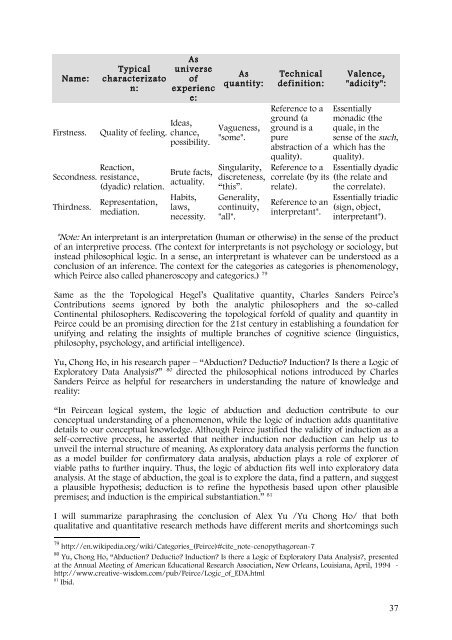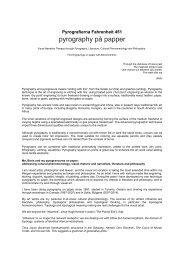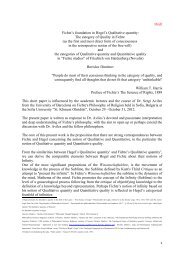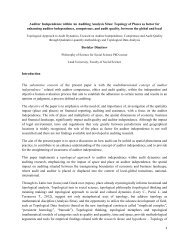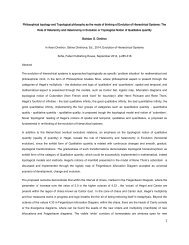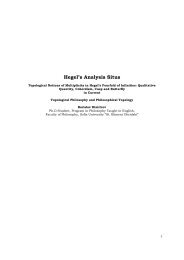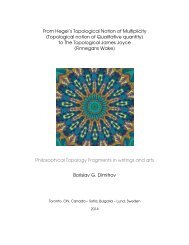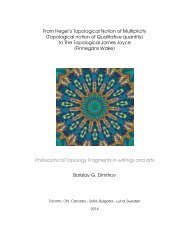Topological Ontology and Logic of Qualitative quantity
Qualitative quantity and BFO (Basic Formal Ontology) of /Barry Smith/ and YAMATO (Yet Another More Advanced Top-level Ontology) of /Riichiro Mizoguchi/
Qualitative quantity and BFO (Basic Formal Ontology) of /Barry Smith/ and YAMATO (Yet Another More Advanced Top-level Ontology) of /Riichiro Mizoguchi/
- No tags were found...
You also want an ePaper? Increase the reach of your titles
YUMPU automatically turns print PDFs into web optimized ePapers that Google loves.
Name:<br />
Firstness.<br />
Secondness.<br />
Thirdness.<br />
Typical<br />
characterizato<br />
n:<br />
Quality <strong>of</strong> feeling.<br />
Reaction,<br />
resistance,<br />
(dyadic) relation.<br />
Representation,<br />
mediation.<br />
As<br />
universe<br />
<strong>of</strong><br />
experienc<br />
e:<br />
Ideas,<br />
chance,<br />
possibility.<br />
Brute facts,<br />
actuality.<br />
Habits,<br />
laws,<br />
necessity.<br />
As<br />
<strong>quantity</strong>:<br />
Vagueness,<br />
"some".<br />
Singularity,<br />
discreteness,<br />
“this”.<br />
Generality,<br />
continuity,<br />
"all".<br />
Technical<br />
definition:<br />
Reference to a<br />
ground (a<br />
ground is a<br />
pure<br />
abstraction <strong>of</strong> a<br />
quality).<br />
Reference to a<br />
correlate (by its<br />
relate).<br />
Reference to an<br />
interpretant*.<br />
Valence,<br />
"adicity":<br />
Essentially<br />
monadic (the<br />
quale, in the<br />
sense <strong>of</strong> the such,<br />
which has the<br />
quality).<br />
Essentially dyadic<br />
(the relate <strong>and</strong><br />
the correlate).<br />
Essentially triadic<br />
(sign, object,<br />
interpretant*).<br />
*Note: An interpretant is an interpretation (human or otherwise) in the sense <strong>of</strong> the product<br />
<strong>of</strong> an interpretive process. (The context for interpretants is not psychology or sociology, but<br />
instead philosophical logic. In a sense, an interpretant is whatever can be understood as a<br />
conclusion <strong>of</strong> an inference. The context for the categories as categories is phenomenology,<br />
which Peirce also called phaneroscopy <strong>and</strong> categorics.) 79<br />
Same as the the <strong>Topological</strong> Hegel’s <strong>Qualitative</strong> <strong>quantity</strong>, Charles S<strong>and</strong>ers Peirce’s<br />
Contributions seems ignored by both the analytic philosophers <strong>and</strong> the so-called<br />
Continental philosophers. Rediscovering the topological forfold <strong>of</strong> quality <strong>and</strong> <strong>quantity</strong> in<br />
Peirce could be an promising direction for the 21st century in establishing a foundation for<br />
unifying <strong>and</strong> relating the insights <strong>of</strong> multiple branches <strong>of</strong> cognitive science (linguistics,<br />
philosophy, psychology, <strong>and</strong> artificial intelligence).<br />
Yu, Chong Ho, in his research paper – “Abduction Deductio Induction Is there a <strong>Logic</strong> <strong>of</strong><br />
Exploratory Data Analysis” 80 directed the philosophical notions introduced by Charles<br />
S<strong>and</strong>ers Peirce as helpful for researchers in underst<strong>and</strong>ing the nature <strong>of</strong> knowledge <strong>and</strong><br />
reality:<br />
“In Peircean logical system, the logic <strong>of</strong> abduction <strong>and</strong> deduction contribute to our<br />
conceptual underst<strong>and</strong>ing <strong>of</strong> a phenomenon, while the logic <strong>of</strong> induction adds quantitative<br />
details to our conceptual knowledge. Although Peirce justified the validity <strong>of</strong> induction as a<br />
self-corrective process, he asserted that neither induction nor deduction can help us to<br />
unveil the internal structure <strong>of</strong> meaning. As exploratory data analysis performs the function<br />
as a model builder for confirmatory data analysis, abduction plays a role <strong>of</strong> explorer <strong>of</strong><br />
viable paths to further inquiry. Thus, the logic <strong>of</strong> abduction fits well into exploratory data<br />
analysis. At the stage <strong>of</strong> abduction, the goal is to explore the data, find a pattern, <strong>and</strong> suggest<br />
a plausible hypothesis; deduction is to refine the hypothesis based upon other plausible<br />
premises; <strong>and</strong> induction is the empirical substantiation.” 81<br />
I will summarize paraphrasing the conclusion <strong>of</strong> Alex Yu /Yu Chong Ho/ that both<br />
qualitative <strong>and</strong> quantitative research methods have different merits <strong>and</strong> shortcomings such<br />
79 http://en.wikipedia.org/wiki/Categories_(Peirce)#cite_note-cenopythagorean-7<br />
80 Yu, Chong Ho, “Abduction Deductio Induction Is there a <strong>Logic</strong> <strong>of</strong> Exploratory Data Analysis, presented<br />
at the Annual Meeting <strong>of</strong> American Educational Research Association, New Orleans, Louisiana, April, 1994 -<br />
http://www.creative-wisdom.com/pub/Peirce/<strong>Logic</strong>_<strong>of</strong>_EDA.html<br />
81<br />
Ibid.<br />
37


